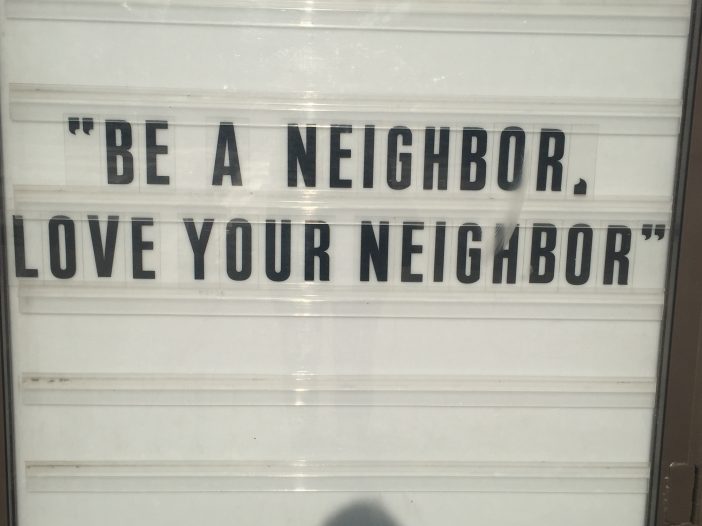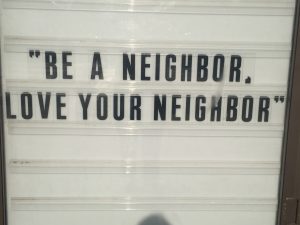
People are feeling more socially isolated and lonely now more than ever. Read this post to learn how to help “all of the lonely people” because we should care. As John Maxwell likes to say, “People don’t care what you know until they know how much you care.”
My last blog post was about the impact of Mister Rogers and how his logical message of calm and kindness is needed right now. I shared how leaders need invest the time and energy to build community because people often don’t know their real neighbors! Another reason building “neighborhoods” is essential in organizations today is because people are more lonely than ever. At a time when we are more “connected” than in the past, research says people are feeling disconnected. Have you heard of FOMO? Social media has created the Fear of Missing Out when they discover what others are doing and they are not included.
Social isolation is particularly important for us as we age. Our social circle tends to naturally shrink as people retire and leave the workplace, decide to move to warmer climates or to be closer to their grandchildren, experience illness, and even death. The key is to work harder to expand your circle of friends. While not always easy because we are creatures of habit, here are some tips to get you thinking:
- Join groups with like-minded people–for pleasure such as bike riding or for causes such as climate change.
- Reach out and develop intergenerational friendships.
- Invite people to coffee to have one-on-one conversations. This is the best way to get to know people of all ages.
- Create new groups (book group, dinner group) and invite new people whom you want to get to know better.
The key at any age is to surround yourself with positive and optimistic people. Read this article for more details as to why being around positive people is so important especially as we get older. Dan Buettner, author of The Blue Zones, has been studying places he calls “blue zones” where people are living a quality life the longest. In fact, “Blue Zones” created a quiz to help you maximize your health and happiness. “The goal of the quiz is not to dump your less healthy friends, but to identify the people in your life who score the highest and to spend more time with them.” Buettner summarizes the importance of developing “neighbors” or true friends:
“I argue that the most powerful thing you can do to add healthy years is to curate your immediate social network,” said Mr. Buettner, who advises people to focus on three to five real-world friends rather than distant Facebook friends. “In general you want friends with whom you can have a meaningful conversation,” he said. “You can call them on a bad day and they will care. Your group of friends are better than any drug or anti-aging supplement, and will do more for you than just about anything.”
Building community by being good “neighbors” in organizations is essential because of the growing social isolation people feel. In a classic research study by Miller McPherson, Lynn Smith-Lovin and Matthew Brashears here were some of the findings:
- From 1985 to 2004, “the number of people saying there is no one with whom they discuss important matters nearly tripled.” Now, 24.6 percent report they have no confidants, family or non-family — that’s one in four Americans. Another 19.6 percent say they have just one confidant. That means 43 percent of Americans have either no confidants or just one, a slice that has doubled since 1985.
- More than half, 53.4 percent, do not have any confidants who aren’t family. In 1985, 80 percent had at least one confidant who was not family; now only 57.2 percent do.
- The average size of Americans’ social networks decreased by a third between 1985 and 2004, from 2.94 to 2.08; basically this means the loss of one confidant.
- The kinds of relationships that decreased the most in providing important contacts were neighbors and co-members of groups or voluntary associations (as opposed to spouse, sibling, parent, co-worker, etc.)
- Women have more family in their networks than men, as they did in 1985. But then they had fewer non-kin close relationships than men did. Now women have about the same number of confidants outside family as do men. Unfortunately, that isn’t because women have made more contacts outside kin, but because men have fewer.
- More education correlates with having larger social networks. Non-whites and the elderly are populations with smaller networks.
But this is the most important finding to remember:
“The number of people who have someone to talk to about matters that are important to them has declined dramatically… we have gone from a quarter of the American population being isolated … to almost half of the populations falling into that category.”
If this is true, what are you as a leader to do?
What can you do?
What are you doing?
What should you be doing?
Are you a good neighbor?

